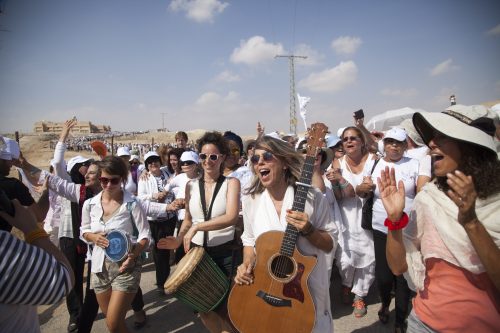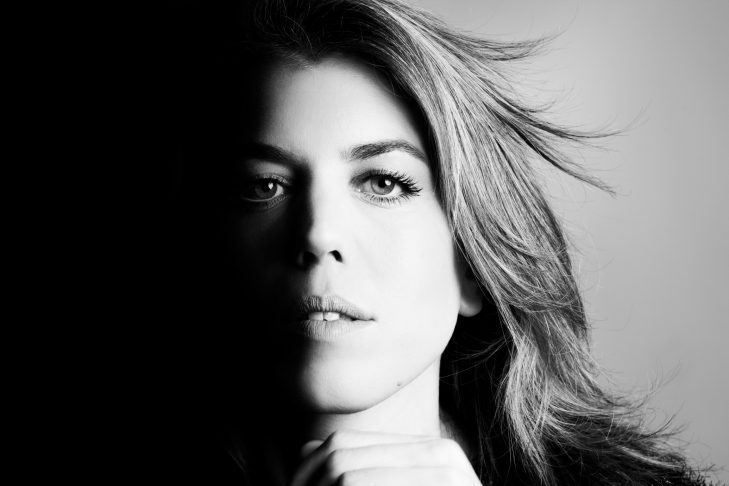Over the years, Yael Deckelbaum, one of Israel’s best-known folk singers, has shared the stage with the likes of Matisyahu, Bobby McFerrin and Suzanne Vega. But perhaps her greatest performance to date has been with the Israeli and Palestinian women associated with the growing grassroots movement called Women Wage Peace (WWP). Founded in the aftermath of Operation Protective Edge, the 2014 Gaza War, women representing every segment of Israeli society came together to pressure the government to make peace between Israelis and Palestinians a priority.
Inspired by successful movements in Northern Ireland and Liberia that united women of diverse faiths and backgrounds in pursuit of peace, WWP gained traction after it received funding from the European Union in 2015. By October 2016, WWP organizers initiated the “March of Hope,” in which, at various points, up to 1,000 women walked from Northern Israel to rally in front of Prime Minister Benjamin Netanyahu’s official residence in Jerusalem.
A year earlier, Deckelbaum had taken her own road trip, which she called “The Road Home.” On the verge of despair about the prospects for peace, the 38-year-old performer traveled to over 40 places in Israel in 45 days. In a recent interview with JewishBoston over Skype, she recalled how the journey “changed my entire perspective of my role as a musician.”
Born to a Canadian father and an Israeli mother, Deckelbaum grew up in Israel playing American and Irish folk music with her father. The award-winning singer-songwriter also performed her own brand of Israeli folk music with her legendary trio Habanot Nechama—a name that means “Daughters of Consolation.”
As successful as she was musically in Israel and around the globe, Deckelbaum said she found her calling as a social activist during “The Road Home.” She recalled: “I sang for free on that trip. It was also a time when people asked me what my hopes and dreams were for Israel. Until that point, I thought that life in Israel didn’t have a horizon and that I had to leave my country. But after ‘The Road Home,’ I knew I had to stay [in Israel] and work for change with the many good people I met along the way.”

Deckelbaum’s activism eventually led her to WWP and the March of Hope. The event was a culmination of Deckelbaum’s long-time dream. “I was so excited that I cried,” she said. “For 12 years, I dreamed of Israeli and Palestinian women marching together, and I was ready to give my music for the cause.” Initially Deckelbaum cast about for an anthem that WWP could uniquely adopt. She considered performing banner songs like “Hallelujah,” “We Shall Overcome” and “Give Peace a Chance” for the march.
As beautiful as those songs were, Deckelbaum said she knew history would be made during the march and the women needed an original anthem to broadcast their cause. “That’s when ‘Prayers of the Mothers’ was born,” said Deckelbaum. “And when we put it up on YouTube it almost immediately went viral. Many things go viral, but what left me in awe was the reason that it has garnered over 3 million views—people are thirsty for goodness. They’ve had enough of darkness and separation. For years, I felt alone with my sadness about the prospects for peace in Israel. But I have met so many people on the road and through this song that I no longer feel alone in my activism.”
The lyrics of “Prayers of the Mothers” are in Hebrew, English and Arabic: “From the North to the South/From the West to the East/Hear the prayers of the mothers/Bring them peace/Bring them peace.” The video—the success of which Deckelbaum attributed to the genius of its director, Astar el Kayam—features both Israeli and Palestinian women singing.
Members of the Rana Choir—a group of Jewish, Muslim and Christian women who live in Jaffa—also appear in the video. Deckelbaum said: “The ensemble of 40 women that gathered to sing with me come from different backgrounds and represent many political views. Some of the women even come from the right, but everyone agrees that we have to find a way to raise the level of love and decrease the violence. We have to find a new way.”
Since the release of “Prayers of the Mothers,” Deckelbaum has been invited to march with women all over the world in pursuit of peace. “I’ve been in Italy, Spain, Berlin and Munich,” she said. “In the coming months, I’m going to Brazil, Argentina, France and the United States. We’ve ignited this movement that had been waiting to emerge.” As for her future musical plans, Deckelbaum is back in the recording studio working on an album that she described as “encompassing this revolution. I’m collaborating with women from all over the world.”
Find information about Yael Deckelbaum’s upcoming tour here.
This post has been contributed by a third party. The opinions, facts and any media content are presented solely by the author, and JewishBoston assumes no responsibility for them. Want to add your voice to the conversation? Publish your own post here. MORE



